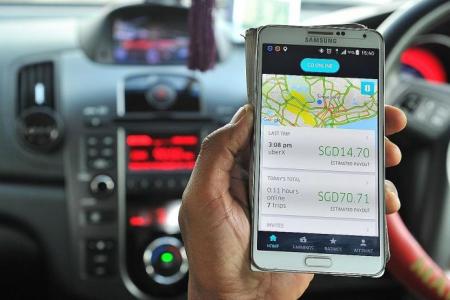Uber, GrabCar drivers to require vocational licences
Parliament sat for the seventh day yesterday as MPs discussed issues affecting the Transport, Water Resources and Environment, and Social and Family Development ministries.
Drivers with popular on-demand transport apps like GrabCar and Uber will now have to apply and obtain a Private Hire Car Driver's Vocational Licence (PDVL).
The new regulations will take effect by early next year, said Senior Minister of State for Transport Ng Chee Meng yesterday.
Mr Ng said that the entry of Uber and GrabCar has made chauffeured services more accessible to the public and disrupted the taxi industry.
Chauffeured services involve matching passengers with a chauffeured car service with the help of mobile apps, while taxi services involve advance bookings and flag-downs.
The number of pre-booked taxi trips has increased by 50 per cent over the last three years, with the bulk of this increase coming from bookings via apps.
An estimated 8,000 to 10,000 drivers provide these services during peak hours. Mr Ng said: "With the growth of apps like Uber and GrabCar, some basic regulations are needed to ensure that the commuters' interests, particularly safety, are taken care of."
To get the PDVL, applicants will be required to undergo a medical examination and background screening. They must also have been holding a Class 3/3A driving licence for at least two years.
They must also attend a 10-hour PDVL course and pass the requisite tests on road and passenger safety.
Subsequently, all PDVL holders must undergo a three-hour refresher course every six years.
Cars used to provide chauffeured services will need to be registered with the Land Transport Authority and drivers are required to display their PDVLs and a tamper-evident decal prominently. This means the decal cannot be tampered with.
An Uber spokesman said their current training programme already ensures that all driver-partners are fully equipped to provide safe and quality service to all riders.
EXISTING
"We are pleased that the Government has adopted many of our existing world-class safety standards in these new regulations," he said.
The spokesman said that currently, Uber driver-partners have to go for pre-activation training, including explaining the in-app safety features for riders and drivers, safety principles and rules, code of conduct, and an introduction to Uber's 24/7 support centre as well as advice on how to maximise their earnings.
Both taxi drivers and private hire drivers said they welcome the new regulations in the industry.
Property agent and GrabCar driver Philip Yeo, 65, said he is glad that there will be a longer training session.
During his training session with GrabCar, he was briefed on how to use the app to accept passengers and operate the GPS, and given tips on driving safely, he said.
Mr Yeo added: "The PDVL course should also include ways to deal with the varied demands of commuters.
"For example, customers often ask to be dropped at places where cars are not allowed to stop. Driving is also especially difficult today due to increased traffic."
Mr Richard Lim, 60, who has been driving a taxi for 11 years, said business has been affected by at least 20 per cent due to the popularity of on-demand transport apps.
He said: "I think it is good that they now have to apply for a licence, which means there is some sort of control in the private-car hire industry.
"For instance, from attire to driving safety, there are minimal standards that taxi drivers are strictly required to follow."
The National Taxi Association proposed that in addition to the new regulations, commuters should also be protected with a clear and transparent accountability system provided by the private-car hire services so that there is proper recourse in case of accidents and disputes.
They also asked for taxi operators to be allowed to dynamically change their pricing according to market demand and supply (just like Uber and GrabCar's practice) to level the playing field between taxi drivers and private-car hire services.
Commuter Benson Ang, 28, who has never used third-party apps like Uber and GrabCar, said he will now reconsider after the new regulations.
Said the engineer: "I was concerned with issues like passenger safety, but I'm more assured now with the additional requirements."
SHORTER COURSE FOR CABBIES
Those applying for a Taxi Driver Vocational Licence (TDVL) course will also undergo a shorter 25-hour course, instead of the current 60-hour course, said Senior Minister of State for Transport Ng Chee Meng.
Mr Ng said the course will focus less on memorising the street directory. Instead, drivers will be taught to use GPS and online navigational tools.
Refresher courses will be shortened to three and five hours compared to the current six or nine hour courses every six years.
In addition, active TDVL holders with good conduct (i.e. no Vocational Licence Points System demerit points) and who are nominated by their taxi companies will be exempted from the TDVL refresher course.
These changes will take effect from next month.
Get The New Paper on your phone with the free TNP app. Download from the Apple App Store or Google Play Store now

